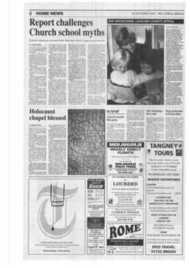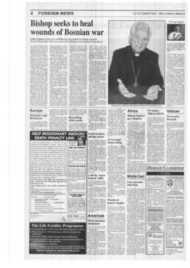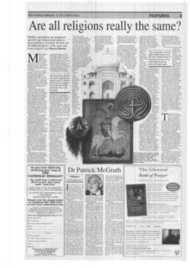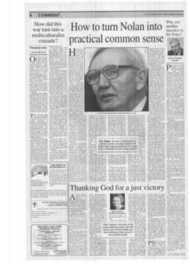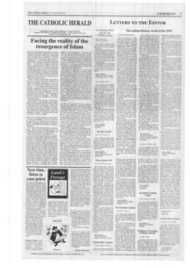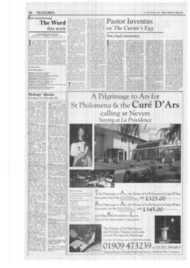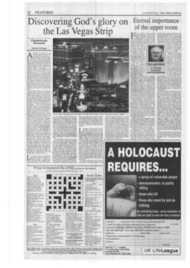Page 4, 12th October 2001
Page 4
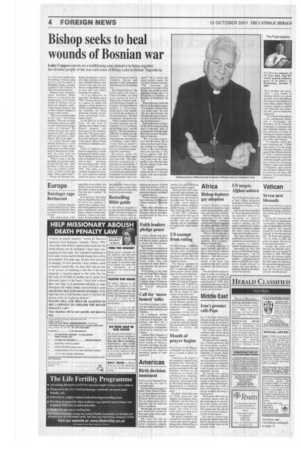
Report an error
Noticed an error on this page?If you've noticed an error in this article please click here to report it.
Tags
Share
Related articles
Retired Anglican Clergyman Paved Way For Pope's Historic...
Vatican Delegate Slams Western Governments Over Refugees
The Country In Europe Where If You Are The Catholic Pp,...
Orthodox Clergy Suffer Too
Pope Seeks To Heal Wounds Of Ethnic Conflict
Bishop seeks to heal wounds of Bosnian war
Luke Coppen reports on a trailblazing new initiative to bring together the divided people of the war-torn town of Banja Luka in former Yugoslavia
IT is over seven months since the Bishop of Banja Luka wrote to the President of Republika Srpska, demanding help for the Catholics of Serb-led northern Bosnia.
Bishop Franjo Komarica asked President Mirko Sarovic to investigate the disappearance of two priests during the Bosnian war, to hand over illegally confiscated Church property and to allow Catholic refugees to return to their homes.
"Why are we being treated in this way?" the bishop pleaded. "Why are we being constantly denied our rights to some fundamental human rights and liberties? We cannot but pose the same questions time and again until we are given a clear answer. This is our right."
It is early October and Bishop Komarica is still waiting for a reply. He is sitting now in an office at the back of Westminster Cathedral, his arms held out imploringly over the table.
"When I went to see the president, do you know what he told me? He said 'Your problem is that you don't have any Catholic politicians.' I looked at him and asked: 'Whose fault is that?'" During the Bosnian war, Bishop Komarica's diocese fell under Serbian control. Over 220,000 Catholics were forced to flee the area now known as Republika Srpska, at least 400 were killed, including five priests.
"It is an ethnocide, or genocide," the bishop said in 1996, "because the presence of a nation, its culture and religion is being wiped out. All the recognisable signs of our existence are being destroyed: churches, monasteries, graveyards, monuments, names ..."
In the Diocese of Banja Luka, 98 per cent of churches and a third of other Church property was destroyed in the fighting. Since the 1995 peace agreement, only 3,845 Catholics have been allowed to return to the region. Most of them are living on charitable assistance.
Tired of imploring the Serbian authorities to aid the beleaguered Catholic population, Bishop Komarica has come to England for the first face-to-face meetings between Banja Luka's leaders since war broke out in 1992. The talks, in the symbolic location of Coventry, were called by a retired Anglican priest, who got tired of mowing his lawn in Crediton, Devon, and decided to help build peace from the ruins of the Bosnian war.
Rev Donald Reeves, the former rector of St James's Church, Picadilly, has spent years gaining the trust of Banja Luka's religious, political and business leaders. In Coventry, he helped them to produce a declaration, promising to work together to resolve the problems of the town known as "the heart of darkness" during the war.
"What I learned from the Coventry meeting was the enormity of the problems facing Banja Luka," said Mr Reeves. "We had enormous difficulty working out the priorities — was it people returning home, the economy or building a multi-ethnic society? From an outsider's point of view, there is a need for an overall plan to regenerate this community."
He pauses, peers out sharply from his black-ringed eyes, then adds: "The international community has a great deal of responsibility. I now join forces with them [the citizens of Banja Luka] in criticising the international community. Its behaviour has been disgraceful, don't you agree?" He is aware that many people regard the Coventry initiative as futile. "The cynicism and pessimism of people within Bosnia and outside is really appalling. Banja Luka is as European as Taunton, or Reading, or Bordeaux," he said.
Bishop Komarica holds Mr Reeves in the highest regard. "I'm grateful to God for this very noble man," he said. "He has showed how the Christian message is universal, how it must not stop at any formal barriers."
Bishop Komarica is hopeful that the Coventry meeting may eventually lead to reconciliation in Banja Luka. But at the moment he entertains no illusions.
"We've reached conclusions like this before. We've been promised many things, but nothing has happened. There is the same danger here now and that is why we've agreed with Rev Donald Reeves to meet again very soon with the same people to see what has been put into practice from what we've agreed."
For more information about the Soul of Europe project, visit www.soulofeurope.com
"DEAR brothers and sisters, today I give thanks to almighty God for my recent apostolic visit to Kazakhstan and Armenia. Kazakhstan is a multi-ethnic country which is working valiantly to rebuild itself materially and spiritually after years of totalitarian oppression.
"The Church in Kazakhstan is also experiencing rebirth, and I encouraged the members of the Catholic community to cooperate with their Orthodox brethren and the followers of Islam in working for a future of justice and solidarity and in rejecting all conflict and violence.
"In Armenia, which this year celebrates the 1,700th anniversary of its becoming officially Christian, I was the guest of His Holiness Karekin II. There I rendered homage to the terrible price which the Armenian people paid in the last century for remaining faithful to their own identity as Christians, and I prayed that all Christ's followers may be witnesses of unity and builders of reconciliation and peace."
blog comments powered by Disqus



